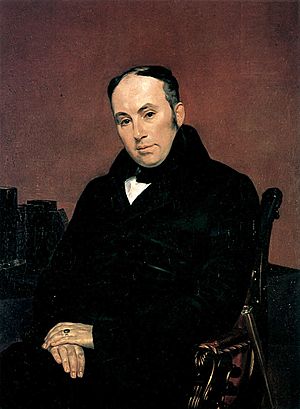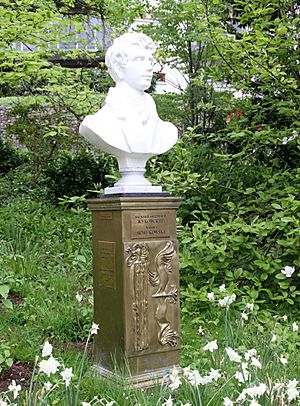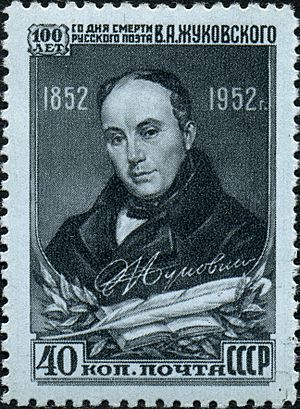Vasily Zhukovsky facts for kids
Quick facts for kids Vasily Zhukovsky |
|
|---|---|

Portrait by Karl Bryullov, 1837–38
|
|
| Born | Vasily Andreyevich Zhukovsky 9 February 1783 Mishenskoe, Belyovsky Uyezd, Tula Governorate, Russian Empire |
| Died | 24 April 1852 (aged 69) Baden-Baden, Grand Duchy of Baden, German Confederation |
| Spouse | Elizabeth von Reutern |
| Issue | Alexandra Zhukovskaya |
| Occupation | Poet |
Vasily Andreyevich Zhukovsky (Russian: Василий Андреевич Жуковский; 9 February [O.S. 29 January] 1787 – 24 April [O.S. 12 April] 1852) was a very important Russian poet in the early 1800s. He helped bring the Romantic Movement to Russia.
Zhukovsky also worked for the Romanov royal family. He was a tutor to Grand Duchess Alexandra Feodorovna and later to her son, who would become Tsar Alexander II. He was known for his many translations of poems from other languages. He translated works by famous poets like Homer, Goethe, Schiller, and Byron. Many of his translations became classics in Russian literature. Some people even thought his Russian versions were better than the originals!
Contents
Zhukovsky's Early Life
Zhukovsky was born in 1783 in a village called Mishenskoe in the Russian Empire. His father was a landowner named Afanasi Bunin, and his mother was a housekeeper named Salkha. Even though he grew up with the Bunin family, a family friend officially adopted him. This was done for social reasons, and he kept his adopted name, Zhukovsky, for the rest of his life.
When he was 14, Zhukovsky went to Moscow to study at the Moscow University Noblemen's Pension. There, he learned about different ideas and writing styles. He was influenced by English Sentimentalism, which focused on feelings, and German Sturm und Drang, which was about strong emotions. He also met Nikolay Karamzin, a very important Russian writer and editor of a popular magazine called The Herald of Europe.
A Young Poet's Start
In 1802, when Zhukovsky was 19, he published a translation of a poem called "Elegy Written in a Country Churchyard" by Thomas Gray. This translation showed his unique sad and thoughtful writing style, which was new for Russian poetry. It made him famous among readers.
In 1808, Karamzin asked Zhukovsky to become the editor of The Herald of Europe. Zhukovsky used this job to explore Romantic ideas and styles, mostly through his translations. He was one of the first Russian writers to create the image of a mysterious and emotional Romantic poet.
Zhukovsky had a deep friendship with his half-niece, Maria "Masha" Protasova. Many of his original poems were inspired by her. He also learned more about Romanticism in the old Hansa cities of Dorpat and Revel, which are now Tartu and Tallinn.
Life at the Royal Court
Zhukovsky's career at the royal court began during Napoleon's invasion of Russia in 1812. At this time, many Russians disliked the French language, which had been popular among the rich. Zhukovsky joined the army to help defend Moscow and was at the Battle of Borodino. He worked with Field Marshal Kutuzov to create messages that would help people feel hopeful and strong.
After the war, Zhukovsky lived for a while in a village near Moscow. In 1815, he wrote many poems during a time known as the Dolbino Autumn. His poems caught the attention of Grand Duchess Alexandra Feodorovna, who was the German-born wife of Grand Duke Nicholas (who later became Tsar Nicholas I). Alexandra invited Zhukovsky to St. Petersburg to teach her Russian. Many of his best translations from German, especially those by Goethe, were made as language exercises for her.
A Powerful Thinker
Even though teaching took him away from the main literary scene, it made Zhukovsky one of the most influential thinkers in Russia. When he moved to St. Petersburg, he helped create the Arzamas literary society. This group wanted to promote Karamzin's ideas, which favored European styles over older, more traditional ones.
A young Alexander Pushkin was a member of the Arzamas society. Pushkin quickly became a brilliant poet, even more so than Zhukovsky himself thought. But Zhukovsky and Pushkin remained friends for life. Zhukovsky often guided Pushkin and protected him at court.
Zhukovsky was good at making friends, and this helped him a lot. His friendship with Tsar Nicholas I saved him from trouble after the 1825 Decembrist Revolt. Many liberal thinkers faced problems after this event. Soon after Nicholas became Tsar, he made Zhukovsky the tutor to his son, Alexander, who would become Tsar Alexander II. Zhukovsky's modern teaching methods greatly influenced the young Alexander. Some historians believe these methods led to the important reforms of the 1860s.
Zhukovsky also used his high position to help other writers like Mikhail Lermontov, Alexander Herzen, and Taras Shevchenko. He even helped buy Shevchenko out of serfdom (a type of slavery). When Pushkin died in 1837, Zhukovsky took care of his writings. He saved Pushkin's unpublished works from being censored and prepared them for publication. In the 1830s and 1840s, Zhukovsky also supported the career of Nikolay Gogol, another close friend. He truly helped the Russian Romantic Movement grow.
Like his mentor Karamzin, Zhukovsky traveled a lot in Europe, especially in German-speaking countries. His connections with the Prussian court in Berlin allowed him to meet important people in spa towns like Baden-Baden. He also met famous cultural figures like Goethe and the painter Caspar David Friedrich.
In 1841, Zhukovsky left his court duties and settled near Düsseldorf. He married Elisabeth von Reutern, who was 18 years old and the daughter of his artist friend, Gerhardt Wilhelm von Reutern. They had two children, a girl named Alexandra and a boy named Pavel.
Zhukovsky died in Baden-Baden in 1852, when he was 69. His body was brought back to St. Petersburg and buried in the Alexander Nevsky Lavra. His grave is near the monument to the famous writer Dostoevsky.
Zhukovsky's Amazing Works
Some experts, like Vladimir Nabokov, believe Zhukovsky was a poet who came very close to being truly great. His main contribution was bringing new styles and forms to Russian poetry. He often borrowed ideas from European literature to create high-quality models for new Russian works. His translation of Gray's "Elegy" is still seen as the beginning of the Russian Romantic Movement. He also wrote some prose, like the short story "Marina roshcha" ("Mary's grove") from 1809, which was about Moscow's ancient past.
Zhukovsky translated from many different sources. In his time, people didn't have the same rules about giving credit for ideas as we do today. He was especially admired for his beautiful translations of German and English ballads. Two of his most famous ballads are "Ludmila" (1808) and "Svetlana" (1813). Both are based on a German ballad called "Lenore" by Gottfried August Burger, but they are very different from each other.
He also translated many works by Schiller, including plays, poems, and ballads. These translations became classic works in Russian. Many people think they are as good as, or even better than, the originals. They were very deep and had a big impact on younger Russian writers, including Dostoevsky.
Zhukovsky also wrote his own poems. His love poems to Masha Protasova, like "Moi drug, khranitel'-angel moi" ("My friend, my guardian angel..."), are considered small classics. Perhaps his most famous original poem is the patriotic ode "A Bard in the Camp of the Russian Warriors." He wrote this to encourage Russian soldiers during the war. He also wrote the words for the national anthem of Imperial Russia, "God Save the Tsar!"
In the late 1830s, after a short break from writing, Zhukovsky returned with a unique translation of a German story called Undine. Zhukovsky's version later inspired an opera by Tchaikovsky.
After retiring from court, Zhukovsky spent his last years translating Eastern poetry, including parts of the Persian epic Shahnameh. But his greatest achievement during this time was his translation of Homer's Odyssey, which he published in 1849. Even though some people have criticized it, this translation became a classic in its own right and is very important in the history of Russian poetry.
Overall, Zhukovsky's work was very important for understanding and interpreting literature in the modern Russian language. He is often seen as the founder of a "German school" of Russian poets and influenced later writers like Fyodor Tyutchev.
See also
 In Spanish: Vasili Zhukovski para niños
In Spanish: Vasili Zhukovski para niños
 | Bayard Rustin |
 | Jeannette Carter |
 | Jeremiah A. Brown |



